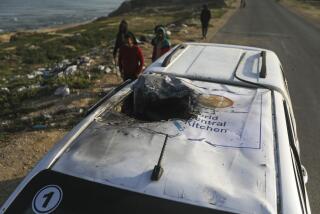The Week Ahead: Mysterious death, diplomacy and a foregone vote
Unearthing the mystery of Pablo Neruda’s death
Monday, April 8: Did famed Chilean poet Pablo Neruda die of cancer or was he poisoned?
The remains of the Nobel Prize laureate will be exhumed Monday from his Isla Negra grave on the Chilean coast as authorities probe allegations that he was murdered in the wake of the 1973 military coup that brought Gen. Augusto Pinochet to power.
The cause of death was listed at the time as advanced prostate cancer. But Neruda’s chauffeur and bodyguard, Manuel Araya Osorio, came forward two years ago with a report that the 69-year-old leftist had appeared well on the morning of his death and, after suddenly becoming feverish, told of being given an injection by a doctor the previous night.
Osorio’s claims in a 2011 Mexican magazine interview prompted the Chilean Justice Ministry to reopen the case and order the exhumation. Forensic scientists have warned, however, that the results of the investigation may be inconclusive because of the state of the remains after nearly four decades.
Neruda was a communist and close ally of President Salvador Allende, who took his own life Sept. 11, 1973, as mutinous troops surrounded the presidential palace.
Keeping a U.S. eye on mounting Israeli-Palestinian tensions
Monday-Tuesday, April 8-9: With artillery exchanges between Palestinians and Israeli troops escalating, the White House has launched some diplomatic follow-up two weeks after President Obama’s inaugural visit.
U.S. Secretary of State John Kerry returns to Jerusalem and Ramallah on Monday to show American concern about the unraveling Gaza cease-fire signed in November, as well as the other myriad threats and tensions that roil the Middle East.
Obama’s trip to Israel, the first of his presidency, was more atmospheric than consequential, although his departing gesture of reconciling Israel and Turkey three years after a deadly clash over a protest ship headed for the Gaza Strip did conclude the Holy Land visit on an encouraging note.
But now that the ice has been broken between Obama and Israeli Prime Minister Benjamin Netanyahu, the heavy lifting of resurrecting Israeli-Palestinian peace talks, and finding common ground with Jerusalem on Iran’s nuclear ambitions and the Syrian civil war, will be left to Kerry.
Though still in the infancy of his role as chief U.S. diplomat, Kerry is a seasoned foreign-policy veteran as a former chairman of the Senate Foreign Relations Committee who had a hand in key international matters for more than three decades.
Replacing a legendary strongman from a weak and fractious field
Sunday, April 14: Venezuelan President Hugo Chavez’s deathbed anointing of Vice President Nicolas Maduro as his chosen successor is expected to propel the former bus driver into the Miraflores Palace after Sunday’s special election.
Maduro, 50, lacks his late friend and mentor’s oratory skill and charisma. But he has been campaigning as the ideological standard-bearer of Chavez and the sole hope for carrying on his “missions” for the poor that provided subsidized food, access to universities, government jobs and new public housing. Nostalgia for Chavez remains strong barely a month after his death from cancer, explaining Maduro’s wide lead -- as much as 20 percentage points in some polls -- over opposition candidate Henrique Capriles.
Venezuelan cities have fallen into the grip of criminal gangs, and Capriles has been trying to stir voter concern for the fate of their oil-dependent economy already hit by Chavez-era nationalizations and neglect of vital infrastructure. But the opposition has failed to gain much traction among poor masses who remain spellbound by the myth of Chavez and his Bolivarian Socialist Revolution.
While the presidential vote appears a foregone conclusion, opposition parties are already looking ahead to municipal elections in July, by which time the weaknesses they see with the post-Chavez socialists may be more apparent to voters.
More to Read
Start your day right
Sign up for Essential California for news, features and recommendations from the L.A. Times and beyond in your inbox six days a week.
You may occasionally receive promotional content from the Los Angeles Times.







